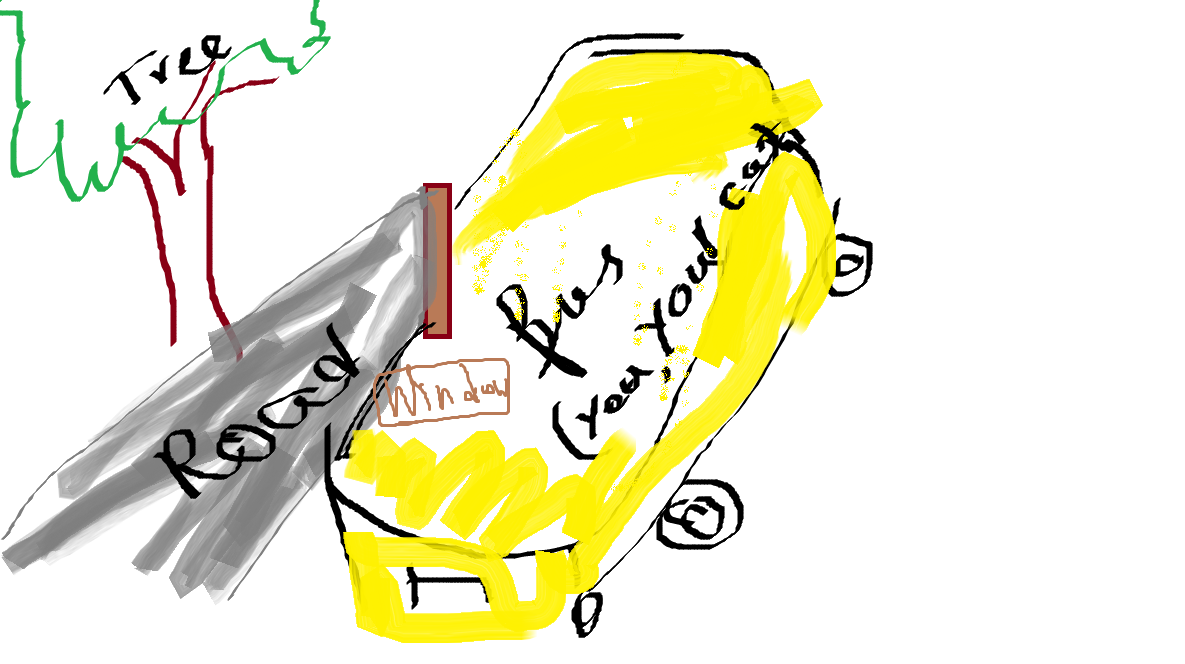I'm not sure this is exactly what you're looking for, but perhaps it will help someone else get the word you want:
superimpose
VERB
[WITH OBJECT]
Place or lay (one thing) over another, typically so that both are still evident.
‘the number will appear on the screen, superimposed on a flashing button’
‘different stone tools were found in superimposed layers’
(From the Oxford Dictionaries)
So, in your sentence, it would be:
I peered through the window with the slick navy blue curtains, swinging to and fro to the movement of the minibus, blocking my view to some extent. I could see my vague reflection on the misty window superimposed on my surroundings.
I just thought of another option: overlay
According to the Oxford Dictionaries:
overlay
VERB
[WITH OBJECT]
Cover the surface of (something) with a coating.
‘their fingernails were overlaid with silver or gold’
1.1 Lie on top of.
‘a third screen which will overlay the others’
This gives:
I peered through the window with the slick navy blue curtains, swinging to and fro to the movement of the minibus, blocking my view to some extent. I could see my vague reflection on the misty window overlaying my surroundings.
Hope this helps!
-----------------------------------------------------------------
I have a few more suggestions, based on recent discussion:
embrace -- Your reflection is there but enveloped by the stronger image of the surroundings. If you wanted to indicate a sense of belonging or feeling at home in the surroundings (or even just an affinity for them), this could work. Your sentence would be:
I could see my vague reflection on the misty window embraced by my surroundings.
Per the Oxford Dictionaries:
embrace
VERB
with object Hold (someone) closely in one's arms, especially as a sign of affection.
‘Aunt Sophie embraced her warmly’
[no object] ‘the two embraced, holding each other tightly’
Accept (a belief, theory, or change) willingly and enthusiastically.
‘besides traditional methods, artists are embracing new technology’
Include or contain (something) as a constituent part.
‘his career embraces a number of activities—composing, playing, and acting’
infuse -- Your reflection has become a part of the view out of the window, infused in your view. Thus:
I could see my vague reflection on the misty window infused with my surroundings.
Per the Oxford Dictionaries:
infuse
VERB
[WITH OBJECT]
- Fill; pervade.
‘her work is infused with an anger born of pain and oppression’
1.1 Instil (a quality) in someone or something.
‘he did his best to infuse good humour into his voice’
shadow -- It's not actually you, but a shadow of yourself.
I could see my vague reflection on the misty window, a shadow on my surroundings.
Per the Oxford Dictionaries:
shadow
VERB
[WITH OBJECT]
- Envelop in shadow; cast a shadow over.
‘the market is shadowed by St Margaret's church’
‘a hood shadowed her face’
ghost -- Even more abstract, I think I like this best.
I could see my vague reflection on the misty window, a ghost in my surroundings.
I could see my vague reflection on the misty window, a ghost haunting my surroundings.
Per the Oxford Dictionaries:
ghost
NOUN
- An apparition of a dead person which is believed to appear or become manifest to the living, typically as a nebulous image.
‘the building is haunted by the ghost of a monk’
[as modifier] ‘a ghost ship’
1.1 A slight trace or vestige of something.
‘she gave the ghost of a smile’
1.2 A faint secondary image caused by a fault in an optical system, duplicate signal transmission, etc.
‘What we saw were clearly ghosts from the static image we'd left on the screen.’
Note especially definitions 1.1 and 1.2.

